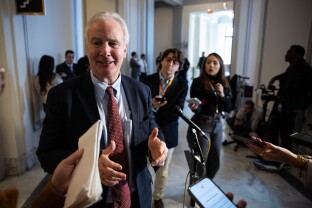As the government shutdown wraps its third week, senators from both parties concede that they don’t know how the impasse will end without help from President Donald Trump.
And Trump has been disengaged from most of the shutdown talk, instead focusing on foreign policy and remodeling the East Wing of the White House. On Friday, he is set to leave for a weeklong trip to Asia — meaning there’s almost no chance the shutdown will end before he returns on Oct. 30.
How long it can drag out beyond that is an open question, but lawmakers are hoping that when open enrollment begins on Nov. 1, there will be renewed pressure to strike a deal. If the shutdown stretches too far beyond that date, things get a lot more complicated if millions of Americans get notices that their premiums are going up.
“President Trump needs to come to the table and discuss this,” Sen. Chris Van Hollen, a Maryland Democrat, told NOTUS. “He claims he cares about health care in America, but right now he’s doing nothing as the clock ticks and we’re about to see an explosion in health care costs around the country.”
Sign Up for NOTUS’ Free Daily Newsletter
Democrats want a permanent extension to the Affordable Care Act subsidies, which expire at the end of the year — but if the shutdown doesn’t end by Nov. 1, getting insurers to retroactively change the cost of premiums for next year would be a messy process, at best.
Katie Keith, the director of Georgetown University’s Center for Health Policy and the Law at the O’Neill Institute, told NOTUS that insurance increases would trigger sticker shock for millions of Americans.
“It’s going to be quite chaotic,” she said. “It is going to be very, very confusing for consumers.”
According to Keith, If lawmakers want to hammer out any kind of deal beyond a simple extension of current policy it will be nearly impossible. Given that partisan tensions are at an all-time high, it’s hard to see how a cohesive deal comes together, especially without Trump in the mix.
And how long the shutdown goes beyond that — without further deadline pressure — is an open question.
Republicans privately acknowledge that as the clock ticks on, Nov. 1 could cause an inflection point in Congress, turning the temperature up on members to find a way to end the shutdown.
The problem for Democrats, who say they are eager to move on a deal that addresses health care and reopens the government, is that so far, Republicans want the government open before any policy talks take place.
“The discussions we’ve had, it’s difficult right now because you got to have Donald Trump engaged. It’s pretty clear that my Republican colleagues don’t want to do anything that might be counter to Donald Trump, and they want to be able to get marching orders from him and then take action at that point,” Sen. Gary Peters, a Michigan Democrat, told NOTUS.
That mismatch means the shutdown drags on, with no evidence the two sides will pivot from stalemate to serious negotiations.
Sen. Tim Kaine, a Virginia Democrat, dismissed the notion that Democrats would not have leverage to negotiate extending the subsidies after Nov. 1.
“There are complicators, but also I think that the compelling case that it has to be fixed also becomes plainer. I’m hearing from more and more Republicans, they’re seeing what folks in their states are experiencing,” Kaine said. “There are some things that become a little more complicated after Nov. 1, but also the case becomes more compelling.”
Sen. Jeanne Shaheen, a New Hampshire Democrat who has been involved in some informal talks on ending the shutdown, told reporters she wasn’t concerned about the open enrollment deadline — she just wants to address health care as soon as possible.
“I think what’s important is being able to help millions of Americans afford their health insurance. And whether that’s November the 1st or December the 1st or next year, that’s critical, because as I’ve said, it’s not just the people who benefit from those premium tax credits,” Shaheen said. “These costs are going to affect all of us, and it’s going to affect our health care system.”
If Democrats have a plan for an off-ramp if Republicans never come to the negotiating table, they’re not sharing it. Senate Minority Leader Chuck Schumer has repeatedly called for a meeting with Trump to end the shutdown, something Trump is clearly not interested in doing.
“They [Republicans] will not move without Trump. That’s the unfortunate reality. Every other president would use the authority they have to bring the parties together, and Trump is using his authority to keep Republicans from engaging,” Sen. Peter Welch, a Vermont Democrat, said. “But a lot of Republicans I talked to know that these premium increases are going to be brutal on the folks they represent.”
Each passing day raises the stakes, besides rising health care costs: federal workers furloughed or laid off, vital federal programs paused and the broader economy feeling the pinch of missed paychecks. The next date for a missed paycheck is Friday.
“I think that more and more people are focused on rising health care costs because they’re getting their notices as we speak. So, you would hope that he [Trump] would want to end it sooner rather than later. But clearly, right now, he’s more focused on his new ballroom at the White House,” Van Hollen said.
Sign in
Log into your free account with your email. Don’t have one?
Check your email for a one-time code.
We sent a 4-digit code to . Enter the pin to confirm your account.
New code will be available in 1:00
Let’s try this again.
We encountered an error with the passcode sent to . Please reenter your email.


